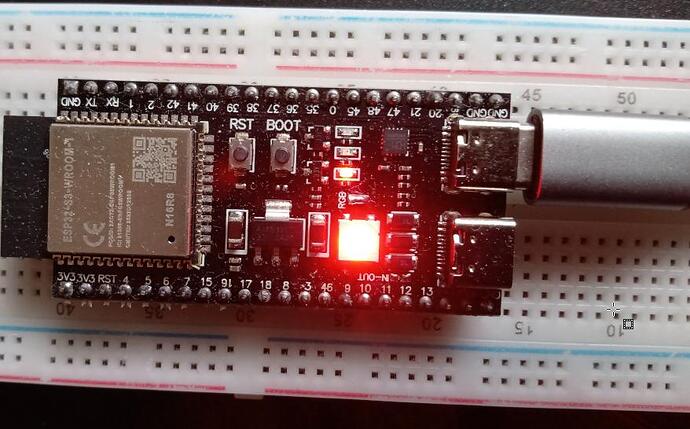Have had nearly the same problems as you, but most of them could be solved .
ad 1) + 2) - I am using one port (that one labeled COM) for both uploading and monitoring
ssif ESP32-S3-DevKitC-1-N16R8V (16 MB QD, 8MB PSRAM)
HARDWARE: ESP32S3 240MHz, 320KB RAM, 16MB Flash
DEBUG: Current (esp-builtin) On-board (esp-builtin) External (cmsis-dap, esp-bridge, esp-prog, iot-bus-jtag, jlink, minimodule, olimex-arm-usb-ocd, olimex-arm-usb-ocd-h, olimex-arm-usb-tiny-h, olimex-jtag-tiny, tumpa)
PACKAGES:
- framework-arduinoespressif32 @ 3.20016.0 (2.0.16)
- tool-esptoolpy @ 1.40501.0 (4.5.1)
- tool-mkfatfs @ 2.0.1
- tool-mklittlefs @ 1.203.210628 (2.3)
- tool-mkspiffs @ 2.230.0 (2.30)
- toolchain-riscv32-esp @ 8.4.0+2021r2-patch5
- toolchain-xtensa-esp32s3 @ 8.4.0+2021r2-patch5
LDF: Library Dependency Finder -> https://bit.ly/configure-pio-ldf
LDF Modes: Finder ~ chain, Compatibility ~ soft
Found 35 compatible libraries
Scanning dependencies...
Dependency Graph
|-- googletest @ 1.12.1
|-- Adafruit NeoPixel @ 1.12.2
Building in debug mode
Retrieving maximum program size .pio/build/esp32S3/firmware.elf
Checking size .pio/build/esp32S3/firmware.elf
Advanced Memory Usage is available via "PlatformIO Home > Project Inspect"
RAM: [= ] 5.8% (used 19100 bytes from 327680 bytes)
Flash: [ ] 4.3% (used 283221 bytes from 6553600 bytes)
Configuring upload protocol...
AVAILABLE: cmsis-dap, esp-bridge, esp-builtin, esp-prog, espota, esptool, iot-bus-jtag, jlink, minimodule, olimex-arm-usb-ocd, olimex-arm-usb-ocd-h, olimex-arm-usb-tiny-h, olimex-jtag-tiny, tumpa
CURRENT: upload_protocol = esptool
Configuring upload protocol...
AVAILABLE: cmsis-dap, esp-bridge, esp-builtin, esp-prog, espota, esptool, iot-bus-jtag, jlink, minimodule, olimex-arm-usb-ocd, olimex-arm-usb-ocd-h, olimex-arm-usb-tiny-h, olimex-jtag-tiny, tumpa
CURRENT: upload_protocol = esptool
Looking for upload port...
Using manually specified: /dev/ttyACM0
Uploading .pio/build/esp32S3/firmware.bin
esptool.py v4.5.1
Serial port /dev/ttyACM0
Connecting....
Chip is ESP32-S3 (revision v0.2)
Features: WiFi, BLE
Crystal is 40MHz
MAC: 24:58:7c:cd:a6:48
Uploading stub...
Running stub...
Stub running...
Changing baud rate to 921600
Changed.
Configuring flash size...
Flash will be erased from 0x00000000 to 0x00003fff...
Flash will be erased from 0x00008000 to 0x00008fff...
Flash will be erased from 0x0000e000 to 0x0000ffff...
Flash will be erased from 0x00010000 to 0x00055fff...
Compressed 15104 bytes to 10429...
Writing at 0x00000000... (100 %)
Wrote 15104 bytes (10429 compressed) at 0x00000000 in 0.3 seconds (effective 358.7 kbit/s)...
Hash of data verified.
Compressed 3072 bytes to 146...
Writing at 0x00008000... (100 %)
Wrote 3072 bytes (146 compressed) at 0x00008000 in 0.1 seconds (effective 443.8 kbit/s)...
Hash of data verified.
Compressed 8192 bytes to 47...
Writing at 0x0000e000... (100 %)
Wrote 8192 bytes (47 compressed) at 0x0000e000 in 0.1 seconds (effective 592.3 kbit/s)...
Hash of data verified.
Compressed 283584 bytes to 159754...
Writing at 0x00010000... (10 %)
Writing at 0x0001c001... (20 %)
Writing at 0x00024b29... (30 %)
Writing at 0x0002a419... (40 %)
Writing at 0x0002f8a6... (50 %)
Writing at 0x00034e6d... (60 %)
Writing at 0x0003caea... (70 %)
Writing at 0x000457d1... (80 %)
Writing at 0x0004b45c... (90 %)
Writing at 0x00050b8c... (100 %)
Wrote 283584 bytes (159754 compressed) at 0x00010000 in 2.4 seconds (effective 964.5 kbit/s)...
Hash of data verified.
Leaving...
Hard resetting via RTS pin...
================================================================================ [SUCCESS] Took 7.53 seconds ================================================================================
Environment Status Duration
------------- -------- ------------
esp32S3 SUCCESS 00:00:07.534
================================================================================ 1 succeeded in 00:00:07.534 ================================================================================
pio run -t monitor -e esp32S3
Processing esp32S3 (platform: espressif32; board: esp32-s3-devkitc-1-n16r8v; framework: arduino)
---------------------------------------------------------------------------------------------------------------------------------------------------------------------------------------------
--- Terminal on /dev/ttyACM0 | 921600 8-N-1
--- Available filters and text transformations: colorize, debug, default, direct, esp32_exception_decoder, hexlify, log2file, nocontrol, printable, send_on_enter, time
--- More details at https://bit.ly/pio-monitor-filters
--- Quit: Ctrl+C | Menu: Ctrl+T | Help: Ctrl+T followed by Ctrl+H
kurz ^
lang ^
lang ^
lang ^
kurz ^
kurz ^
kurz ^
_brightness=127
using this platformio.ini
[platformio]
default_envs =
d1_mini
[env]
framework = arduino
[env:esp32S3]
platform = espressif32
board = esp32-s3-devkitc-1-n16r8v
upload_port = /dev/ttyACM0
upload_speed=921600
test_port = /dev/ttyACM0
test_speed=921600
monitor_port = /dev/ttyACM0
monitor_speed=921600
debug_port=/dev/ttyACM1
lib_deps =
${env.lib_deps}
adafruit/Adafruit NeoPixel@^1.12.2
build_flags =
-D SPEED=921600
-D RGB_BRIGHTNESS=32
-D ESP32S3
debug_tool = esp-builtin
debug_init_break = break setup
build_type = debug
The other port is needed when you want to debug and yes you can (or must  ) connect both, but (at least under linux) you should be aware to connect them in the order COM and then USB - otherwise the device names would be reversed.
) connect both, but (at least under linux) you should be aware to connect them in the order COM and then USB - otherwise the device names would be reversed.
ad 3) To use the on board LED, I had first to solder a little bit as mentioned here and had to add lib Adafruit NeoPixel, but then …
